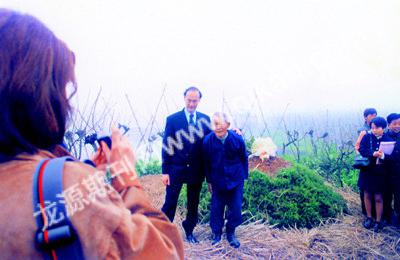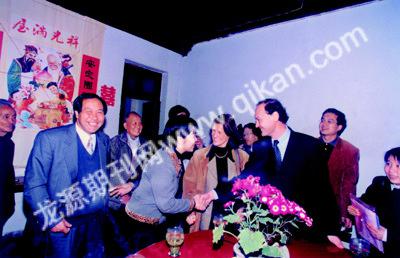A Visit to a Royal Swedish Resident with Chinese Ancestry
2009-06-08ZhangJianzhi
Zhang Jianzhi

So we are on a plane to Sweden. The westward flight is bringing us through a sky that seems to have no night. We are a group of Chinese from Huzhou and we are on our way to pay a return visit to Robert Tchang, our distant cousin in Sweden.
Though Digang is a small town in Huzhou, it produced dozens of provincial graduates and metropolitan graduates in history. The town is also home to some national celebrities in modern-time China. But none of us in Huzhou expected to hear that we have a distant cousin in Sweden and that he is a member of the royal house of Sweden. Five years ago, we in Huzhou were surprised to learn that a Swedish royal house member would come to Digang in search of his ancestral roots.
Scholars in Huzhou did a fast research through their bookshelves and rural family books available. The result was clear: our distant cousin Robert Tchang in Sweden is the grandson of Zhang Zushen. Born in Digang in 1876, the boy showed academic brilliance in his early years. After his father died when he was 17, he dropped his school education for a while and worked to support his younger brother to study in a modern school in Shanghai. The familys finance became better when he was in early 20s. So he was able to focus on academic studies again. His assiduous study paid off. In 1900 he became a provincial graduate and four years later he became a metropolitan graduate, the top honor for a scholar in the central empire. That year he was 29. His career as a diplomat for China began. He served as a Chinese diplomat in Russia and Holland before he became the Chinese ambassador to Belgium. In 1920, he was appointed Chinese ambassador extraordinary and plenipotentiary to both Sweden and Norway.
Zhang Zushen married a Swedish girl and the couple had a son. Zhang Zushen came back to China and died of a disease in his prime years, leaving the son behind in Sweden in the care of a Chinese diplomat. The son grew up and married a movie actress in Sweden and they had a son. The father died young and the wife remarried a member of the royal house of Sweden, bringing the young son into her second marriage. Thats how Robert Tchang became a member of the royal house.

Robert Tchang and his wife came to visit his hometown in April five years ago. Villagers gave him a princely reception. Villagers reasoned that Robert Tchang is a Swedish prince since he is someone of the royal house. The path to the ancestral tombs was covered, not with a red carpet, but with dry straws so that shoes would not be stained with soil. Everyone in the village treated him as a long lost relative. They went with him to the graves. Robert Tchang was also given a book of family history which traces its roots to ancient times.
We land at Stockholm after a flight of eight hours. We are picked up at the airport. The driver is a Chinese who speaks Beijing dialect. We pass through exotic views of towering needle-leaved trees and birches. After a journey of bridges and bays, we reach our hotel in a valley.
The next day we arrive at the Robert Tchangs house on a seaside avenue in the old downtown of Stockholm where ancient architectures are well maintained.
It is a luxurious house. The steps leading to the door are flanked by six bronze statues. A small elevator carries us into the sitting room of the house. Robert Tchang and his wife are away from the city and they will come back next day. So we meet with Robert Tchangs 19-year-old son Nicola. We have a nice chat about his ancestral roots in China.
The next day we go to another house where Robert Tchang and his wife live. We receive a royal reception at the couples house. We have tea and cake. Robert Tchang shows us the family history book he brought back five years ago. We then look at the pictures he took during his visit to Digang. Then we are able to look at the certificate of appointment issued to Zhang Zushen in 1920 by Xu Shichang, the president of the Republic of China. The certificate is well kept in a frame. Robert Tchang shows us a set of Mahjong tiles. They are contained in several drawers in a small mahogany box with a lacquer pattern in red. The mahjong tiles are now a family heirloom. We talk about his grandfather. I read some of his grandfathers Chinese poems through the interpreter. Then we take photos of each other and take group photos.
Before we leave, Robert Tchang and I chat privately for a while. I promise I will write about our reunion in Sweden after I return home. He also gives us a gift made of crystal to mark our visit. We shake hands. Robert Tchang says that he will visit China in the spring of 2009, together with some Swedish business people for the purpose of seeking investment opportunities in China.
As our car moves away slowly, we see Robert Tchang and his family on the balcony waving to us.□
